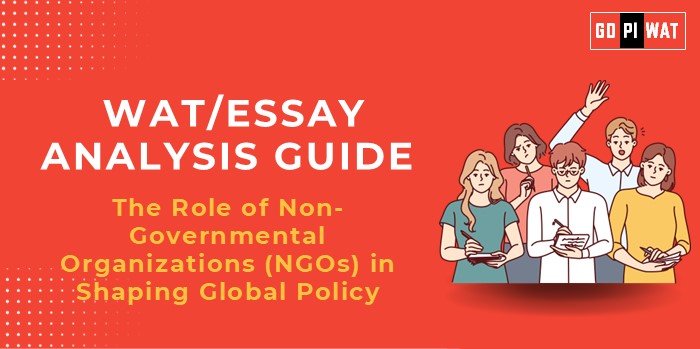📋 WAT/Essay Analysis Guide: The Role of Non-Governmental Organizations (NGOs) in Shaping Global Policy
🌐 Understanding the Topic’s Importance
NGOs bridge critical gaps in governance and policy implementation, particularly in areas like climate change, human rights, and global health. For B-schools, understanding NGO dynamics offers insights into public policy, CSR, and strategic management.
📝 Effective Planning and Writing
- ⏱️ Time Allocation:
- 🕒 Reading & Planning: 5 minutes
- ✍️ Writing: 20 minutes
- 🔄 Review: 5 minutes
- ✍️ Structure:
- Introduction: 60 words
- Body: 375 words (Achievements, Challenges, Future)
- Conclusion: 65 words
💡 Introduction Techniques for Essays
- ⚖️ Contrast Approach: “While governments often struggle to address transnational challenges effectively, NGOs have emerged as agile and impactful actors in global policymaking.”
- 💡 Solution-Based Approach: “NGOs’ ability to connect grassroots needs with global frameworks makes them indispensable in shaping policies that address today’s pressing challenges.”
📋 Structuring the Essay Body
- 🏆 Achievements:
- NGOs’ pivotal role in the UN Sustainable Development Goals (SDGs).
- Grassroots health initiatives like polio eradication by Rotary International.
- ⚠️ Challenges:
- Politically motivated restrictions in authoritarian regimes.
- Lack of standardized accountability measures.
- 🚀 Future Outlook:
- Strengthening NGO-government partnerships.
- Leveraging technology for transparency and global outreach.
📄 Concluding Effectively
- ⚖️ Balanced Perspective: “NGOs are vital players in global governance, but their effectiveness depends on enhanced transparency and strategic collaboration with governments and the private sector.”
- 🌍 Global Comparison: “From Greenpeace’s environmental advocacy to CARE International’s humanitarian efforts, NGOs demonstrate the power of collaboration in tackling global challenges.”
📊 Recommendations for Sustainable Progress
- 📜 Standardize accountability through frameworks like IATI.
- 🤝 Increase collaboration between NGOs, governments, and private sectors for funding and policy implementation.
- 🌍 Empower NGOs in restrictive environments through international coalitions.
✍️ Sample Short Essays
- ⚖️ Balanced Perspective: “NGOs play a critical role in global policy, particularly in areas like climate action and human rights. However, addressing their internal and external challenges is essential for sustainable impact.”
- 💡 Solution-Oriented: “To maximize their influence, NGOs must adopt transparent practices, foster collaborations, and focus on grassroots empowerment alongside global advocacy.”
- 🌍 Global Comparison: “While NGOs in democracies have driven significant policy shifts, their role in restrictive regimes remains limited, highlighting the need for international support.”


